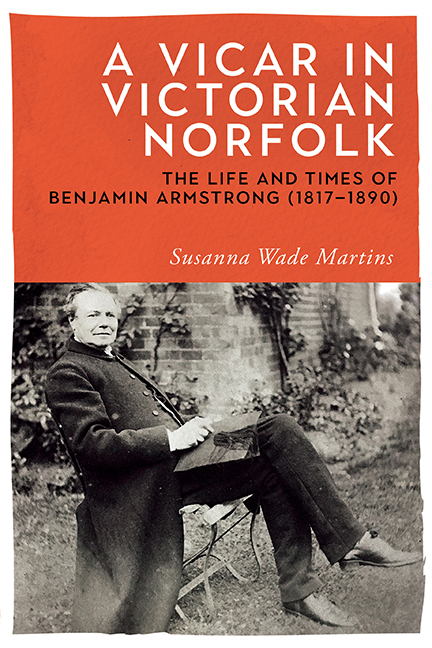Book contents
- Frontmatter
- Contents
- List of Illustrations
- Acknowledgements
- Foreword
- Author's Note
- Map
- Introduction
- I The Early Years
- 1 Early Life
- 2 The Move to Dereham
- II Public Life
- 3 The Norfolk Clergy
- 4 Church Life
- 5 The Building Legacy
- 6 Schools
- 7 Town Life
- III Family and Friends
- 8 Family Life
- 9 Friends
- IV Later Life
- 10 The Later Years
- 11 Armstrong: A Man of His Time
- Bibliography
- Timeline
- Index
6 - Schools
Published online by Cambridge University Press: 14 August 2020
- Frontmatter
- Contents
- List of Illustrations
- Acknowledgements
- Foreword
- Author's Note
- Map
- Introduction
- I The Early Years
- 1 Early Life
- 2 The Move to Dereham
- II Public Life
- 3 The Norfolk Clergy
- 4 Church Life
- 5 The Building Legacy
- 6 Schools
- 7 Town Life
- III Family and Friends
- 8 Family Life
- 9 Friends
- IV Later Life
- 10 The Later Years
- 11 Armstrong: A Man of His Time
- Bibliography
- Timeline
- Index
Summary
The Anglican church had long been involved with the provision of education, mainly through individual trusts associated with churches, where schools established as a result of bequests were often housed in an upper room above the church porch. By the early nineteenth century it was clear that these charity schools were no longer sufficient and so the Church of England National Society for Promoting the Education of the Poor was founded (1811), with the aim of providing a school in every parish. In 1812 the Norfolk branch was set up and was responsible for either supporting or founding most of the rural schools in Norfolk established before 1870. At its inaugural meeting, called by the Lord Lieutenant and attended by some of the county's leading landowners and churchmen, the Bishop of Norwich was appointed patron. In his letter of acceptance, the Whig-supporting Bishop Bathurst made it clear that he did not want there to be any antagonism between non-conformists and the Anglican schools, but all should work together. This is what we would expect from this liberal-minded man, who had many Unitarian friends and who later voted in the House of Lords for Catholic emancipation. Following this, a questionnaire was sent by the archdeacon to all incumbents asking them what educational provision there was within their parishes and what opportunities existed for setting up schools. Answers were received from 175 clergy and survive amongst the diocesan records.2 Forty-nine parishes had Sunday Schools, twenty-one had day schools and in forty-three education was provided part-time or on Sundays. There were plans for schools in seventeen parishes, but in forty-two none were proposed. Sub-committees were then formed in each deanery and these contributed towards the purchase of or providing schoolrooms, the salary of the teacher and provision of teaching materials. The first school to be founded outside Norwich with support from the National Society was at Hingham in 1812. It was to serve Hingham and its surrounding parishes and was open every afternoon. An annual grant of £16 was allocated and books and slates for 100 children donated. Schools that had already been founded by clergy and other individuals were accepted into the National Society, offered an annual grant and provided with books.
- Type
- Chapter
- Information
- A Vicar in Victorian NorfolkThe Life and Times of Benjamin Armstrong (1817–1890), pp. 145 - 162Publisher: Boydell & BrewerPrint publication year: 2018



